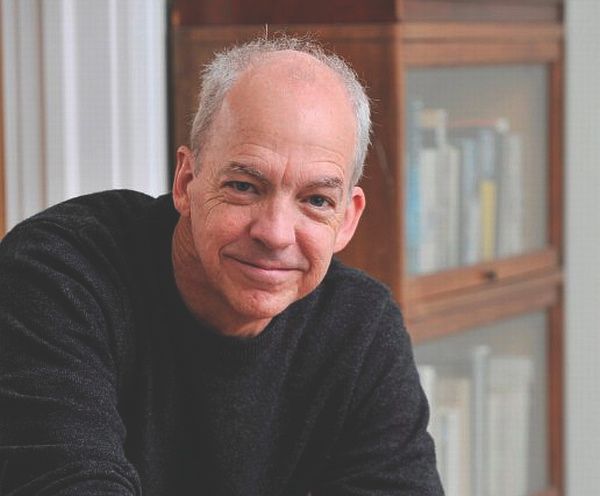
In Dan Fesperman’s new book, Unmanned (Knopf), Darwin Cole, an F-16 fighter pilot turned drone operator, struggles with the aftermath of a Predator attack that mistakenly kills Afghan children, a tragedy Cole witnesses on video from the Nevada outpost where he’s stationed. A team of freelance journalists learns about the mission-gone-awry, and their investigation takes them from Nevada to Baltimore to Maryland’s Eastern Shore. Along the way, the intriguing story touches on the changing nature of warfare (drones, military privatization, etc), the state of contemporary journalism, and the culture of surveillance.
Fesperman, a former Sun reporter, tackles those issues in the following Q&A. Tonight, he’ll be signing copies of Unmanned at The Ivy Bookshop‘s launch party, which starts at 7 pm.
What event or development initially piqued your interest in writing about drones and surveillance?
Several years back I read a news account of Air Force pilots being shanghaied into the drone program. Here were these hotshot fighter jocks, disappearing into quiet isolated trailers in the Nevada desert to wage war from afar. Often it was tedious, but at other times they had to watch for hours on end a lot of gory and disturbing detail resulting from their actions. Then in their off hours they were expected to melt back into the ‘burbs as regular old dads and husbands. That presented too many wonderful possibilities to pass up.
The surreal nature of Cole’s job is unnerving, as is the role of IntelPro. What do they tell us about how warfare is changing in the 21st century?
Cole’s job represents the ultimate triumph of the REMF (Rear Echelon Motherf**kers), a derisive term coined by the grunts in the front lines. It’s a breakthrough in risk-free combat. Here you have perhaps the single most effective reconnaissance tool in the history of warfare, and the biggest occupational hazard of operating it is the daily commute. As for Intelpro, I find the whole concept of private armies to be fairly disturbing. Who are these private soldiers truly answerable to? To the country that hired their employer, or to their employer? Obviously the latter. And what does that mean? A few years ago I liked to joke that someday we’ll see a firefight between two privateer units competing for the same objective. Then I talked to a few people who’d witnessed up close some of the mess and confusion of the goings-on in the Afghan-Pakistan border areas with these kinds of outfits, and it no longer seemed very funny.
After the Palestinians used drones in the current conflict with Israel, I heard a reporter refer to them as “terrorist weapons.” But what are your thoughts on such a comment as it relates to the spread of this technology?
Like any remarkably useful and innovative tool of war, it’s original users fall in love with it – until it’s then used against them. The more drones proliferate, the more we’ll begin to fear their possibilities.
Is the Eastern Shore actually a hotbed of spy and military activity?
As the book mentions, the Shore was indeed the sight of a crash of a Global Hawk military drone a few years ago, flying out of the Pax River base. As for spying, just about any part of the country can become a hotbed under the right circumstances. Pumpkin patches in Carroll County don’t generally come to mind as hotbeds for spies. Yet, one of the biggest espionage trials of the Cold War turned on a roll of microfilm hidden there. In recent years the Eastern Shorehas become a magnet for powerful Washingtonians at leisure, most notably Cheney and Rumsfeld, with homes near Oxford and St. Michael’s. But it’s the remoteness of some parts of the Eastern Shore that made me want to use it in certain scenes. It’s a bit like the part of tidewater North Carolina that the company formerly known as Blackwater uses for its training facility.
Journalism has changed profoundly, a seismic shift that’s reflected by the team of independent/freelance reporters in the book. Are there any journalists working today that you especially admire/respect? Why?
Absolutely. My wife, for starters. Liz Bowie, who probably knows as much about Maryland education as any state or local officials in the field, and covers a beat as well as anyone. I especially admire all the reporters who’ve stuck it out at the nation’s big dailies, through the hardest, leanest years of cutbacks and buyouts and generally idiotic management decisions across the board at the top of the big chains like Tribune. And while freelancers and Internet journalists have broken plenty of huge stories, and do a lot of vital work as the ranks grow thin, the best journalism is still being produced by the writers at the traditional dailies, with the New York Times firmly at the top of the heap.
I noticed that the two men on the investigative team are named Steve and Cole. Was that a tip-of-the-hat to Steve Coll?
No, but I’d shamelessly agree to say that it was if the esteemed Steve Coll, who I believe is now dean of the J-School up at Columbia, would shamelessly agree to write a glowing review of my book.
